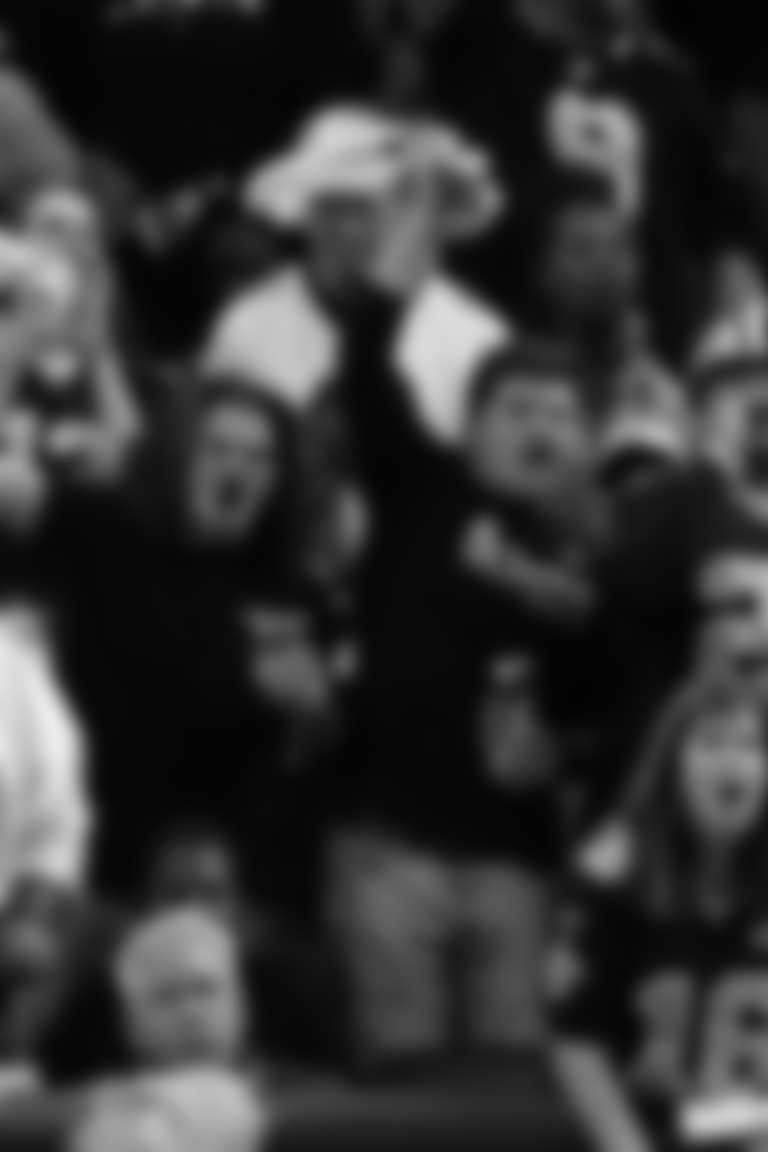Secondary coach Aaron Glenn is entering his fifth season on Coach Sean Payton's staff, and after a 15-year playing career, has been tasked with molding a young secondary that includes cornerback Marshon Lattimore and safeties Marcus Williams and C.J. Gardner-Johnson . This year, veteran safety Malcolm Jenkins was added to the mix as an unrestricted free agent. The group often reflects the fiery Glenn – he almost becomes a participant in drills and his verbal exchanges with senior offensive assistant Curtis Johnson are colorful, to put it mildly – and under his tutelage, Lattimore was named NFL Defensive Rookie of the Year in 2017. Glenn is looking for another growth spurt from the unit in 2020
Q: You seem to be a very social person, especially when we see you interact during drills. What has that part of the isolation been like for you, to be away from the players?
Glenn: That's always the hardest part as a coach. I've always claimed to be a coach that's interactive with my players, and hands on like a part of the drill. And not being able to do that, that's always hard to do. But these opportunities to get on these Zoom calls and Webex, just talking and slowly be able to go through film, slowly be able to go through the installs, the guys get a really good understanding of what we're doing. You don't have to go through every coverage that you have, so you can specifically pick up certain coverages that you want to really dial into. It's been really good. It's something that I can see, going forward, it might be a change as far as offseason is concerned.
Q: How beneficial is it for you to have a veteran secondary, because it's not as if you're trying to implement the system to new players who might not understand it as readily as veterans?
Glenn: That's always good, to have guys that have been in this system for a while. And I always say this statement the past couple of years: Even though the guys have played a lot of football, a lot of those guys in our secondary are still young. When I look at Marshon Lattimore, Marcus Williams, but then we brought in Malcolm Jenkins – very intelligent, highly professional, is really going to help our back end with the things he brings to the table. D.J. Swearinger, same type of guy, has been around the league for a while. Even though he's new to our team, he understands football so a lot of these coverages and things that we're doing are not going to be different for him. And then, it's time for Marcus and Lattimore to take the next step. And I expect that from both of those guys, and I challenge both of those guys throughout the offseason. And then you've got Janoris (Jenkins), who's been around for a while – again, nothing new to him. And then P.J. (Williams), just the ultimate Swiss army knife for us. He's a guy that I think sometimes is taken for granted, but I'm glad that we have him back.
Q: What makes Janoris Jenkins so valuable as a player?
Glenn: I did a high-level study on Janoris just over his career, and when you think about it, when he first got into this league, he came in as one of the better corners in this league. He was a really good press corner earlier in his career, made a lot of plays on the ball. And then as his career started to develop, he started to have this knack of being an off corner, and being able to anticipate and see the quarterback and be able to make plays on the ball. But that didn't take away his ability to play press coverage and I think that's one of the things that really can be tapped into. He actually hasn't had a chance to do as much when he was with the Giants, and that's what we do – we're a press team, we want those guys to be able to go up there and challenge. I want to be able to tap into that and allow him to do what he came into the league being a really good player at. Plus, also, being able to use those off skills that he developed in his career. I'm excited to have the player. I'm excited to be able to have an offseason like we've been doing with this player, I'm excited to have this player in training camp going into the whole season.
Q: You mentioned "next steps" for Lattimore and Williams. What would that look like for those guys and what do you want to see out of them to make that next step?
Glenn: Well, I would tell you this and I think both would tell you also: I'm hard on both of those guys, because I see greatness in both of them. And I don't want them to limit themselves to being just a talented player. I want them to have the whole gamut of what an NFL player should be like, and that's not just going out there covering a receiver, that's not just playing in the middle of the field. Marcus has to be better at playing down low, he has to be better as a tackler. I want to consistently see him make plays on the ball, but I don't want him to force those plays and I think sometimes that gets into his head. Everybody is saying that he's 'this' type of player. We know the type of football player you are, Marcus, just go out there and play football and don't try to force these plays. It's the same with Lattimore, also. I want him to be not just a great cover corner, but I want him to be the smartest corner. Because he's a corner that you hardly ever see in this league, because he's a really good tackler and he's a physical player. So when you have a guy like that, we want to take advantage of that skillset as much as we can, allowing him to play the position to be able to see the quarterback and be able to react and go make tackles and things like that. I want those guys to be all-around players. I don't want them to be limited to anything they can do, and I'm going to continue to challenge them from that aspect.
Q: As a coach, what's the line between letting the players express themselves – especially in times like these – and trying to work with them in that team dynamic?
Glenn: You have to give a lot of credit to (General Manager) Mickey (Loomis), Coach Payton, (Assistant General Manager) Jeff Ireland, for the type of players we bring onto this team. Everyone talks about culture. Everyone wants to build culture. Everyone wants to know, what is culture? There's one thing I say in the (defensive backs) room all the time. I say, 'Culture is coach-fed, but it's player-led.' Meaning that, we as coaches set the standard, we give direction, but the players have to police it. That's one thing that we have in our locker room, and that's one thing that I commend Mickey, Sean and Jeff for bringing guys in because we have cultured players. And when you have guys like Malcolm…no one's afraid to sit there and talk and give their opinions on what's going on. That's where communication comes in hand, that's where education comes in hand. And now I think those guys have a plan of action that they're going to go by and get things done. The good thing about our team, we have that. With the players that we have, we have it. No one was afraid to give their opinion and talk about it. Then, you take the teams that don't have that culture. Now, it's up to the head coach – he has to step in, he has to make sure that he sparks the dialogue. That's the good thing about it, we have the coach that can do it and we also have the players that are not afraid to do it. I think that's what makes our team such a good dynamic.
Q: (Defensive coordinator) Dennis (Allen) mentioned P.J. Williams' ability to play safety and how that might help with disguise. How much have you guys seen from him in that spot and is that something he could potentially do a little bit more, and what did you learn from him last year when he was doing that?
Glenn: My respect for P.J. – I've always had respect for him – but my respect for P.J. went to another level after the Tennessee game (last season). We had a good amount of injuries in that game and I was able to talk to P.J. on the sideline, coach him up for what we have to do to get him to play. And there were some things that he just knew. And that's the thing I was talking about with the veterans we have. They just know football, and you just give them some parameters to play in and some ideas on how we have to do certain things, and they'll go out there and perform for you. And that's what P.J. did for us. So P.J., in baseball they call them five-tool players. I don't know if I'm saying it the right way they use it, but P.J. can play safety for us – and that's either one, free or strong. He can play the nickel, he can play the dime, he can play corner for us. So he's a very valuable player for our defense. You hear coaches talk about now position-less players, and I see him being one of those guys. You just don't (list) him at a position, because he can play a number of positions for you. I think that's what this game is going to. As a coach, the game's evolving into getting players like that. You see the Malcolm Jenkins' who can play safety, he can play dime. You see Chauncey (Gardner-Johnson), he can play safety, he can play nickel, he can play dime, he can play corner if we need him to. I think that's where the wave of players (is going). You can move them around, they can be in different positions and for the offense to identify where they're at, I think (the opposing offense can) sometimes struggle.
Q: With C.J. Gardner-Johnson, what is the next step in year two, what do you want to see him do?
Glenn: Getting better mentally and understanding our scheme to a tee. Getting better in coverage because he will be playing a good amount of nickel-back for us in the slot. He'll be covering top-level receivers in the slot and we're not afraid to put him in there and let him cover guys because he has that skill set. He's uniquely built for the nickel because he's very compact. He's 210 pounds so he's able to play in the box, he's able to make tackles just like P.J. (Williams) did. Both of those guys did a really good job playing in the box for us. So that's where I see his growth as far as mentally, really understanding football and not just playing football. We've been on a lot of zoom calls this offseason and he's getting that down. Just understanding what the offense trying to do when they're in certain formations and how are they trying to attack you. He's getting better at that.
Q: When you mention C.J. Gardner-Johnson just needing to get better mentally, do you also mean maybe just learning to play within himself? He's a very passionate player obviously, but that can be great or sometimes it gets you in trouble.
Glenn: Yeah, but I would say this – it's helped him more that it hurt him. And you never want to take away a player's personality because sometimes you take his thing away from him. You've just got to control it. You have just got to let him understand there's some that you can and can't do, alright? But I want you to be yourself go out there and play. The mental part, it is not that he cannot pick the scheme, he can do that. It's learning football. The best thing in this league for a player is to understand football. You can know your playbook. You can have the best technique you want. But if you're not understanding what the offense is trying to do to attack you, you're always going to be a step behind and that's what I am trying to teach all our players. These formations, positions, guys, they're there for a reason, so how can I get you to understand what they're doing pre-snap, so your post-snap reaction can be a lot quicker.
Q: When you're looking for one of these position-less players, what kind of traits are you trying to identify, is it an intelligence thing, is it a physical thing, is it a little bit of both?
Glenn: I think you're always looking for the intelligence factor for anybody in the secondary, but physically can they handle being in the box, make tackles and play like a linebacker. Do they have the ability and the speed to cover receivers? When these teams go fast and they catch you on these personnel packages where you can't get out of it, can that guy just go out there and operate like a nickel corner? These guys can do that, the ones that we have, P.J. and C.J. So those are the things that you're looking for. The physical traits, you're always looking for the intelligence, the guys that can actually play (in the box) and have the body type that can do it, but also be on the outside and cover receivers.
Q: Is this trend toward (position-less players), do you think this is something that could have always been a thing or is this something that coaches have had to adapt to and be willing to kind of change?
Glenn: I think it's something that you have to be willing to change. Back in my day, when I was playing, you had true free safeties, true strong safeties. I remember I played with (Steve) Atwater, he was a true strong safety. I played with Victor Green, he was a true strong safety. You didn't want those guys playing deep because it wasn't what they did best. Nowadays you see these interchangeable-type players that can play in the box, they can play back deep, they can play in the slot, they can do a number of things. Plus I think it's hard for the offense to try to identify guys, especially when you have a ton of these guys on the field. That's why you see teams like Baltimore, they might only have one D-lineman and they'll have five linebackers and the rest are defensive backs or one D-lineman, three linebackers and the rest are defensive backs. Now, you've got to identify who's coming, who's going to be blitzing. When you have guys like that, it just makes you a better team and allows you to do a lot of things defensively as a coach, and schematically to attack the offense.



















